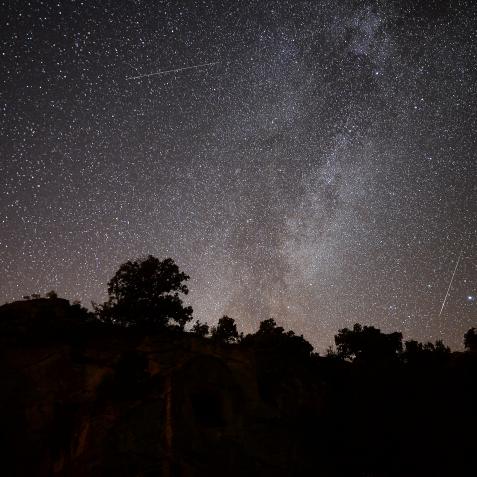
SCIEPRO
When Was There Life on Venus?

What we have is a cosmic whodunit. Venus, the second planet from the sun and considered by the more romantic types as "Earth's twin" and the avatar of love, is dead.
Air pressure 90 times greater than on Earth. Temperatures hot enough to melt lead. An atmosphere composed of toxic carbon dioxide and sulfuric acid.
In other words, hell.
And yet, billions of years ago, things were different. Venus really did resemble a sister of our planet: liquid water oceans, white fluffy clouds, a place for life to potentially call home.
And now, like I said, dead. What did it?
The conventional story goes like this. Billions of years ago our sun was smaller and dimmer, and Venus was perfectly fine, chilling out. But as the sun aged it got brighter and hotter. Venus started to sweat. The oceans began to evaporate. The increased water vapor in the air trapped more heat. The oceans dried up. With no more oceans to lubricate the gears, tectonic activity - the great shifting of continental plates - shut down. Carbon that would normally get recycled and buried deep within the planet was instead vented into the atmosphere, skyrocketing the temperatures and choking off any possibility for life.
All this happened long, long ago, when life on Earth was nothing more than simple, microscopic one-celled critters wiggling around in the ocean.

Photo12/Universal Images Group via Getty Images
Maat Mons is displayed in this three-dimensional perspective view of the surface of Venus. Magellan.
But new research suggests Venus didn't die billions of years ago. Its oceans may have survived until relatively recently - up to a mere 700 million years ago (which is basically "yesterday" when it comes to astronomy).
The researchers used state-of-the-art computer simulations, the same kinds of simulations used to predict the effects of climate change on the Earth, to see how a brightening sun would scorch Venus.
And what they found is that the relationship between Venus and the sun was... complicated.
It turns out that many little details had big impacts on the survivability of Venus' oceans (and hence the survivability of any potential life that may have developed over there). In some cases all the water dried up right away, but in many cases the presence of large oceans was able to absorb the impact of the hotter sun, keeping everything in the chill zone for a couple billion years--until it couldn't.
Something especially bad happened to Venus about 700 million years ago. The phrase used around polite company is "global resurfacing event" but a more accurate phrase would be "Venusian Armageddon".
In a series of calamities, the surface of Venus managed to flip itself inside out, releasing an unholy amount of buried carbon dioxide into the atmosphere, where it stayed and trapped heat, dealing the final death blow to the doomed planet.
We don't know how long it lasted. We don't know if it was one single disaster or a series of unfortunate events.
All we know is that this catastrophe happened. And while for decades we had thought that at this point Venus was already long dead, the new research suggests that water and life may have been clinging to existence (and perhaps even thriving) before this final coup de grace.
Could our sister planet have hosted life of any form? Did that life have the time and opportunity to evolve into more complex organisms? Did they reach the capability to watch and understand as their world literally turned inside out?
Venus holds many secrets beneath its cruel atmosphere, and for now, she's not telling.



















